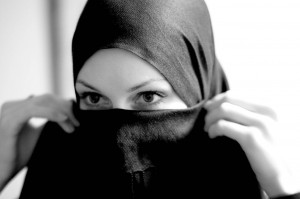One Step Forward, Two Steps Mubarak? Women in New Eygpt
A recent photography competition casts a spotlight on the role of women in revolutionary Egypt — but women’s rights are under threat under Egypt’s new leaders, writes Farz Edraki.
A woman in red hijab. She stands in a crowd of helmet-clad police officers, protesters, and cameramen. Her gaze is steadfast; resolute. The caption on the photo reads: ‘In front of the Supreme Court, on the 25th of January.’
The photo was awarded first prize in the 2012 Women of New Egypt competition, sponsored by the E.U. Delegation to Egypt.
The series highlights the role of women in the wake of the Arab Spring: women clutching candles and flags, leading processions of protestors; women lining up to vote in the December 2012 referendum; women weaving carpets in the family home.
But does a “new Egypt” really signify a new era for Egyptian women?
Since civil unrest began in January 2011, culminating in the downfall of President Mubarak, and the election of an Islamic party to office, women’s rights have come under national and international scrutiny.
Political and social upheaval has forced women to occupy new roles in Egyptian society. It was women who were at the forefront of communication during the revolutionary period, rallying people from landline telephones while the internet and mobile phone services were down. It was women who posted videos on YouTube urging fellow Egyptians to protest against Hosni Mubarak. It was women who stood alongside men in countless protests in Tahrir Square.
Yet, it is women who now face depreciated rights under new constitutional arrangements. Women’s groups have expressed concern that the new constitution — passed 15 December — does not guarantee women’s rights and freedom of expression.
Women’s groups are particularly concerned that a provision protecting women’s rights was explicitly left out of the new constitution. Further, Article 10 isolates the role of women in society as tied to the family home: ‘the state shall provide free motherhood and childhood services and shall balance between a woman’s obligations toward the family and public work. The state shall provide for special care and protection for single mothers, divorced women and widows.’ Other provisions in the Constitution refer to ‘rules of Islamic jurisprudence’ as the yardstick by which equality between women and men should be measured.
Only 33 per cent of Egyptians voted on the 15 December referendum, which begs the additional question of whether the new constitutional amendments are a reflection of the country’s wants or the failings of a fledgling democracy. Further, only seven per cent of the Constituent Assembly which drafted the new constitution were women.
The Guardian reports that Egypt’s parliament is considering several laws which would curtail women’s rights, including setting the legal age for women to marry down to 14, and automatically awarding custody of children (over the age of eight) of separated parents to the father. The new government has also discarded pre-revolutionary proposals for laws that would have allowed women to divorce their husbands.
The World Economic Forum’s Global Gender Gap report ranks Egypt 120 out of 128 countries in terms of gender equality.
In February 2011, 10 Egyptian feminist NGOs issued a statement on the role of women in post-revolutionary Egypt: ‘As women, we have been active participants in the Egyptian popular revolution and will continue this role, insisting on the full participation of women in the political and decision-making processes in the coming period.’
Despite these broad-sweeping ambitions, current reports from the Middle East indicate that women’s rights are not being furthered in practice. The Saudi Gazette revealed that at least 25 female protesters were sexually abused in Tahrir Square during 2013 demonstrations to mark the second anniversary of the revolution.
‘It is disappointing how Egyptian women were purposefully marginalized after their heroic role in the January 25th Revolution that ousted 30 years of dictatorship,’ Dali Ziada, Egypt’s Office Director for the American Islamic Congress, told the Woodrow Wilson International Centre for Scholars for a special report for International Women’s day on 8 March, 2012.
On this year’s anniversary of International Women’s Day, it is time to stop and once again reflect on women’s rights in Egypt: are we going one step forward, two steps Mubarak?
By Farz Edraki


